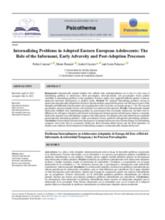Internationally adopted children who suffered early institutionalization are at risk of a late onset of internalizing problems in adolescence. Both pre-adoption, adversity-related, and post-adoption factors predict variability in internalizing problems in this population.
Previous studies have suggested different patterns of parent adolescent informant discrepancies in adoptive dyads.
Method:
The authors analyzed internalizing problems among 66 adolescents internationally adopted from Russia to Spanish families using both the parent- and self-report version of the Strengths and Difficulties Questionnaire and comparing them with a low-risk, community group (n = 30). They assessed pre-adoption and post-adoption factors and evaluated cross-informant discrepancies. Results: Internationally adopted adolescents exhibited more internalizing problems by parent-report than community adolescents, but there were no differences by self-report. Adopted youth showed no discrepancies between parent and self-report, whereas community adolescents reported more internalizing symptoms than their parents.
Pre-adoption adversity-related factors predicted parent-reported internalizing problems, while post-adoption factors predicted self-reported internalizing problems.
Conclusions:
Parent-adolescent informant discrepancies in adopted adolescents from Eastern Europe for internalizing symptoms were lower than in community adolescents. Both adversity-related factors and the lived experience of adoption may influence the development of internalizing symptoms in internationally adopted adolescents.

